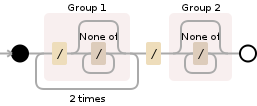ここに投稿された質問と同様に、Javaでの解決策を探しています。
つまり、文字列から文字/文字列のn番目の出現のインデックスを見つける方法は?
例:「/ folder1 / folder2 / folder3 /」。この場合、スラッシュ(/)の3番目の出現を要求すると、それはfolder3の前に表示され、このインデックス位置を返すことが期待されます。私の実際の意図は、文字のn番目の出現からそれをサブストリング化することです。
Java APIで利用できる便利ですぐに使えるメソッドはありますか、またはこれを解決するために自分で小さなロジックを記述する必要がありますか?
また、
- Apache Commons LangのStringUtilsで、この目的でサポートされているメソッドがあるかどうかをすばやく検索しましたが、見つかりませんでした。
- この点で正規表現は役に立ちますか?
